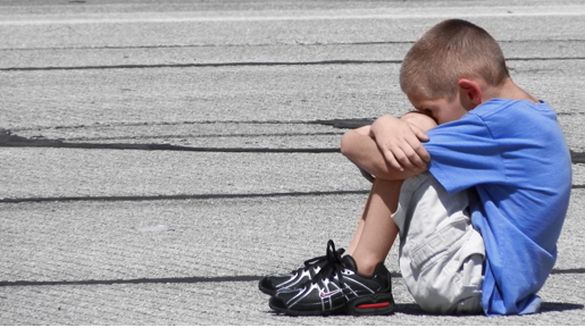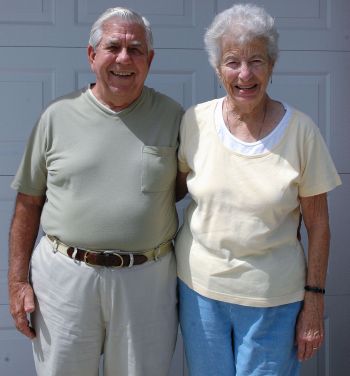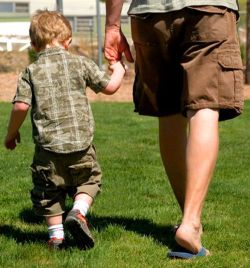‘Guardian Angels’ Champion Children’s Interests In Court
By Robert Hughes // October 15, 2012
Community issues & volunteering

BREVARD COUNTY • PALM BAY, FLORIDA – The growing drug epidemic in the United States is well-documented, with more than 1.3 million drug arrests made in 2009 alone. Much is written about the people arrested, but little is noted about what happens to their children.
Normally, a judge takes custody of children if she deems their parents unfit and she assigns caseworkers to find a suitable temporary living arrangement for the kids.
But while taking an abused or neglected child from a life that may involve sleeping in a shelter or car may be seen as a godsend, the alternatives provided by the state aren’t always rosy, either.
First, it’s difficult for the children because they don’t understand why they’re taken from their parents.
Then the children sometimes end up being bounced from foster home to foster home — or worse, mistreated.
In her book, “Three Little Words,” former foster child Ashley Rhodes-Courter tells of being tossed between 14 foster homes in nine years of her Florida childhood — and wrongly blaming herself for each “rejection.”
She even tells of one foster mother who tormented her with hot sauce, “time outs” under kitchen counters in contorted positions and horribly unsanitary conditions.
Therefore, the children may be taken from their natural parents — who may suffer other problems aside from drugs, including mental issues — only to be placed into harmful living situations that can arise within an impersonal bureaucratic system.
That’s where a form of hero can step in, as it happened for Ashley in the form of what she called her guardian “angel.”
When a judge places a child in state custody, she can look toward a program of dedicated volunteers called Guardians ad Litem to help look out for the best interests of the child.

Origins
The Guardian ad Litem program was started in 1977 by an Illinois judge who tired of making legal decisions about children he didn’t know enough about.
He thought volunteer guardians could make informed and unbiased judgments if they were allowed full access to information about the kids and the legal possibilities they faced.
Florida started its Guardian ad Litem program in 1982.
Guardians ad Litem don’t take foster children into their own homes.
Still, being a Guardian ad Litem is not your average volunteer opportunity.
Rather, it is one where an adult can have a huge impact on children’s lives.
But it requires a toughness to ward against the difficulties faced, even as they harbor a softness for the children themselves.
At age 80, Bill O’Hara might not seem the sort who would voluntarily take on such a challenge, but he’s been serving as a Guardian ad Litem in Brevard County for almost 18 years.
As a great-grandfather of five, O’Hara has witnessed some terrible things as a volunteer guardian.
“To see children who have been abandoned and abused is so horrible, it’s unimaginable,” he said. “It breaks your heart.”
The Palm Bay resident has served as Guardian ad Litem for kids of all ages and currently looks after two babies.
He said recent experience has shown him that little infants carry the biggest heartbreaks.
Two other babies O’Hara represented in the past year were the worst cases he’s seen.
One baby had numerous bones broken in its body and is just healing now after four months, he said.
The other baby was born with opiates in its system.
“It makes you sick, it really does,” he said. “But you don’t say anything. You get disgusted, but you have to hide it.”

Parents
O’Hara offered a typical scenario of the type of parent who has children taken away in Brevard County.
“The average case is a woman, white and poor, about 20, unmarried, basically drugged-up. Some are prostitutes and they’ve been abused themselves. It’s not a pretty scene,” he said.
“Babies are shake-babies or on opiates (because of their mothers’ use). Some of these kids don’t overcome problems with narcotics. At 2-years-old, their minds start going in different directions. You see a child on drugs, it makes you cry. In one case, a mother was taking all these opiates the day after her kid was taken away.
“Will the kid make it?” he asked. “I’d say no.”
Guardians ad Litem like O’Hara receive more than 30 hours of training for the work.
No legal background is needed, rather “just street smarts,” as O’Hara puts it.
The guardians learn how to give children a voice in the legal system after researching what the best situation for them would be, including what foster home would be acceptable.
They deal with parents, teachers, bureaucrats, doctors and lawyers — some of whom aren’t exactly agreeable to their suggestions.
But the judges seek the guardian’s input, which often supersedes what a lawyer or parent might suggest.
“I’ll go the extra mile for my kids,” O’Hara said. “One judge called me a bulldog.”
He summarized a Guardian’s role this way.

Guardian’s role
We make sure a child has a good place to live, goes to school and does well, gets medical treatment… and perhaps a hug and some encouragement he might not otherwise receive,” he said.
O’Hara’s background as a Goodyear representative who got to know the rougher areas and residents of Philadelphia is what he said helps him face his tougher cases.
And coming from what he called a “dysfunctional family,” he said the “payment” he receives for his Guardian ad Litem efforts is “I love you.”
“That’s all I need because it’s something I didn’t get as a child,” he said.
Another volunteer, Joann Solley-Hansen of Melbourne Beach, has been a Guardian ad Litem less than a year.
But she expressed many of the same feelings about her volunteer efforts, as well as a tough background.
For one thing, she spent a year volunteering as a domestic violence victim’s advocate.
And, she said, “I was a firefighter in Connecticut, so nothing really shocks me.”
However, she had to admit that serving as a Guardian ad Litem takes her into “the most horrendous situations I’ve ever seen, sexual and physical abuse, non-existent parenting and kids trying to raise themselves.”
For the record, Guardians ad Litem as a rule refer to foster parents as “saints” who have to learn to deal 24 hours a day with children who are often troubled.
Some foster homes are a different story, however.
O’Hara said one home for girls in Melbourne “needs to be shut down” because of drug and sex trafficking.

Staying safe
With all the troubles Guardians ad Litem may face, great care is taken to keep them safe in their work.
George Paulk, the supervisory attorney for the Guardian ad Litem program in this district, which includes Brevard and Seminole counties, said “We have mentoring, and we go out and visit people in sketchy neighborhoods in numbers, or we might call the police (to go with them).”
He also emphasized that most natural parents end up being cooperative, once they understand the Guardian ad Litem’s role.
“There are very few people you appreciate more than those who help your kids,” Paulk said.
O’Hara agreed.
“When kids hear we’re their Guardians ad Litem and will be there for them, they call us their guardian angels,” he said.
Still, sketchy situations do arise — especially in the courthouse, where guardians must appear to support the kids.
O’Hara told of being with a child under his watch who had just testified against his mother in the courtroom.
“She started in on her son and I got hit by her, then threatened by her daughter,” he recalled. “So, you have inherent risks. But I use my head.”
Solley-Hansen described one situation that made her wary, but never involved a confrontation.
“One of my girls was 15 and had a baby,” she said. “She was in a gang. We would have very frank conversations. She lived in a house with the gang and its drug deals. She has a baby, so I have to report all that. She is good, but the situation has us worried. I had to fill out a report (that could result in having) the baby taken from her. There could be repercussions. It’s just a head’s-up situation.”
According to Paulk, this district has 500 children under the watch of 250 volunteer guardians.
He said the program had enough volunteers until recent budget cutbacks, but now “we definitely could use more.”
“If I can make a difference in one child’s life, it’s worth it. When one of them rises up and brings the walls down, it’s just amazing.” Bill O’Hara, Brevard Guardian ad Litem
Difficulties
The difficulties faced by these volunteers may be daunting, but that only serves to make the rewards even greater.
Guardian ad Litem volunteer recruiter Patricia Williams said, “When children (who were in the program) call back years and years later to talk to their guardians with success stories, that’s the best feeling.”
O’Hara was equally glowing.
“I want to do this (be a Guardian ad Litem) for the rest of my life,” he said. “If I can make a difference in one child’s life, it’s worth it. When one of them rises up and brings the walls down, it’s just amazing.”
Solley-Hansen and her husband have three grown sons of their own, soyou could say she’s had decades of training for her volunteer efforts — including keeping her humor intact.
“My kids say, ‘Didn’t you have enough trouble with us?’” she says in reaction to her decision to serve as Guardian ad Litem to other kids.
“But I just say, ‘Yeah, but I was thinking I could do it better this time.’ They just laugh.”
For more information about becoming a Brevard Guardian ad Litem, call 321-690-6823.
(VIDEO BELOW: guardianadlitem18)













Nice writing style. I look forward to reading more in the future.